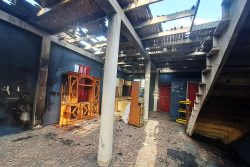Dear Editor,
As I watched the devastation wreaked by Hurricane Dorian on The Bahamas, I could not help but reflect on how fortunate we are in this part of the world. We are spared many of the natural calamities that countries in other parts of the globe experience from time to time. We are truly a blessed country. We are enormously endowed with natural resources. Now, we have oil and gas which could potentially leap-frog us out of poverty. Indeed, we have all that it takes to catapult us to higher levels of prosperity.
All we need to do is to fix our politics which, for too long, has been adversarial. The genesis of the fractured system of governance predated the existing political parties, namely the PPP and the PNC. It started since the early days of European colonial rule when, according to our historians, divide and rule tactics were employed to keep the subject population at bay. Attempts were made, unsuccessfully, to use Amerindians in the beginning to capture runaway slaves. With the introduction of slavery and indentureship, Africans were pitted against Indians and vice versa but that again proved unsuccessful.
It was not until the formation of mass-based political parties in the 1950s that some measure of success was made by the then colonial rulers to drive a wedge between the two major ethnic groups, Indians and Blacks represented by the PPP and the PNC respectively. Prior to the split of the PPP in 1955, there was hardly any manifestation of deep-seated ethnic political rivalry. In the 1953 elections, the first under universal adult suffrage, the PPP won a landslide victory which ushered in, for the first time, a truly nationalist and multi-racial government, albeit with limited powers.
With the split, there emerged a pattern of voting along ethnic lines even though it could be argued that the split was more tactical and ideological rather than racial. This was manifested in the fact that a significant numbers of Blacks supported the Jagan-led PPP and quite a few Indians supported the Burnham faction of the PPP. It was only after the 1957 elections, which was decisively won by the Jagan-led PPP, that race became much more pronounced and remained so until this day.
The ethnic dilemma is a factor in our politics ever since the split of the PPP in 1955. This cannot be swept aside. It is likely to continue this way for some time until the economy is sufficiently buoyant to push ethnicity in the backwater of our political landscape. The underlying reason for ethnic cleavage is the perception that economic security can be best realised by way of an identification with a political party that is perceived to be representative of a particular ethnic group.
This is not to suggest that the PPP did not enjoy considerable multi-ethnic support. In fact, the PPP remains the largest multi-racial political party in the country with the majority of Amerindian support and a fair amount of Black support. I have always held the view that the PPP’s working class orientation and its history of struggle against colonialism, neo-colonialism and dictatorial rule gives it a distinct identity and electoral appeal across the ethnic and political spectrum.
The dynamics of race-based politics could change with the emergence of oil and gas in the years ahead.
Yours faithfully,
Hydar Ally






